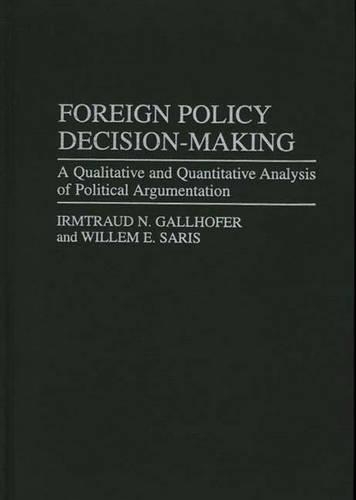
Foreign Policy Decision-Making: A Qualitative and Quantitative Analysis of Political Argumentation
(Hardback)
Publishing Details
Foreign Policy Decision-Making: A Qualitative and Quantitative Analysis of Political Argumentation
By (Author) Irmtraud N. Gallhofer
By (author) Willem E. Saris
Bloomsbury Publishing PLC
Praeger Publishers Inc
20th March 1996
United States
Classifications
Tertiary Education
Non Fiction
International relations
327.1
Physical Properties
Hardback
296
Description
This book investigates how politicians, in order to convince their audiences, argue about preferences for different courses of action. The qualitative and quantitative studies presented here are based on written records and deal with a variety of foreign policy issues, countries, and political regimes. Examining the argumentation employed by Hitler and Kennedy to ministers of the Austro-Hungarian empire, the authors conclude that only six basic forms of persuasion seem to be used and understood by politicians and their audiences, and that these same approaches are used almost irrespective of the political situation. This fascinating study of political argumentation will be of interest to scholars of political communication, rhetoric, political science, and international relations.
Reviews
"The book's findings have major implications for decision making in business and political affairs, including international affairs, and should be studied by those who are involved in such decisions as actors or researchers."- Herbert A. Simon, University Professor of Computer Science and Psychology, Carnegie Mellon University
"This book, the culmination of a research program of almost three decades, is a very important contribution to the study of foreign policy decision-making. This book should be of interest to all students of foreign policy decision-making."-Ole R. Holsti, George V. Allen Professor Department of Political Science, Duke University
"In the exemplary discussion of how to apply their method, Gallhofer and Saris carefully explain how to analyze documents to reconstruct their argument structures according to the four classes. They also painstakingly demonstrate how to formalize argument structures as decision trees, and how to determine the argumentationrules applying....For those interested in the interdisciplinary branch of decision theory, the volume will stand out for its taking experimentally tested concepts from the laboratory to actual foreign policy decision-making situations....[T]he book offers an interesting method for formally specifying foreign policy arguments."-Schweiz. Zeitschrift fur Politikwissenschaft
In the exemplary discussion of how to apply their method, Gallhofer and Saris carefully explain how to analyze documents to reconstruct their argument structures according to the four classes. They also painstakingly demonstrate how to formalize argument structures as decision trees, and how to determine the argumentationrules applying....For those interested in the interdisciplinary branch of decision theory, the volume will stand out for its taking experimentally tested concepts from the laboratory to actual foreign policy decision-making situations....[T]he book offers an interesting method for formally specifying foreign policy arguments.-Schweiz. Zeitschrift fur Politikwissenschaft
The authors provide a theoretical and methodological study of decision-making approaches to specific foreign policy cases... Highly recommended for faculty involved in teaching advanced research methods classes and those interested in quantitative decision making in political science and international relations.-Choice
"The authors provide a theoretical and methodological study of decision-making approaches to specific foreign policy cases... Highly recommended for faculty involved in teaching advanced research methods classes and those interested in quantitative decision making in political science and international relations."-Choice
Author Bio
IRMTRAUD N. GALLHOFER is Senior Researcher at the Sociometric Research Foundation in Amsterdam and has been engaged for more than 20 years in research on political decision-making and text analysis./e Her articles have been published in a variety of European political science and psychology journals. WILLEM E. SARIS is Professor of Statistics and Methods at the University of Amsterdam./e In addition to his work on structural equation modeling and the improvement of measurement procedures, he has published several papers on decision making with Irmtraud Gallhofer.
